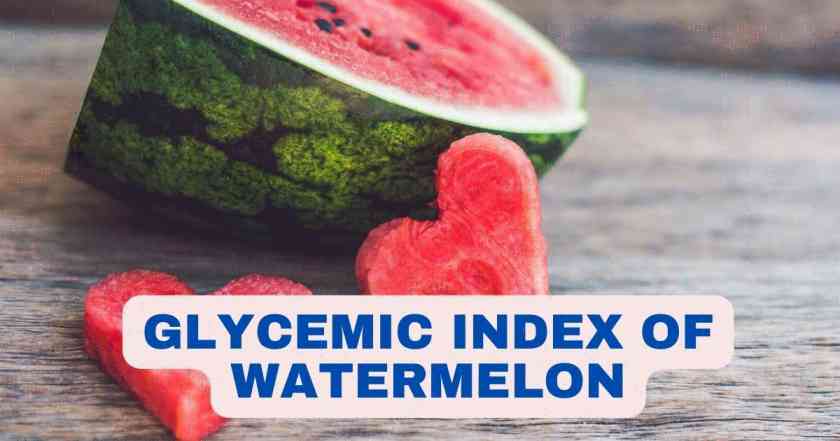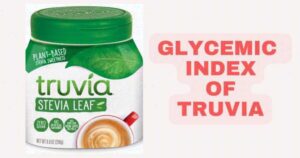Watermelon is a juicy and refreshing fruit that is beloved by many, especially during the summer months. It is not only delicious but also packed with essential nutrients. When it comes to the glycemic index (GI) of watermelon, it is considered to be relatively low.
The glycemic index is a scale that measures how quickly and how much a particular food raises blood sugar levels after consumption. It ranks foods on a scale of 0 to 100, with pure glucose having a value of 100, representing the fastest and highest rise in blood sugar levels. Foods with a low GI (below 55) are digested and absorbed more slowly, resulting in a gradual and steady release of glucose into the bloodstream.
Glycemic Index of Watermelon
What is the GI Index of Watermelon?
- Glycemic Index (GI) of Watermelon is 72. The exact GI value of watermelon can vary depending on factors such as ripeness, variety, and individual metabolism.
- The GI of watermelon falls within the range of 72 to 80, classifying it as a food with a moderate glycemic index. This means that the carbohydrates in watermelon are digested and absorbed relatively quickly, leading to a moderate increase in blood sugar levels.
One reason for the moderate glycemic index of watermelon is its relatively high sugar content. Watermelon is naturally sweet and contains natural sugars, primarily fructose. While fructose does not cause an immediate spike in blood sugar like glucose does, it can still contribute to an increase in blood sugar levels when consumed in larger quantities or in individuals with impaired fructose metabolism.
Glycemic Load of Watermelon
It is crucial to consider the glycemic load (GL) in addition to the glycemic index. The glycemic load takes into account both the glycemic index of a food and the amount of carbohydrates it contains per serving. Watermelon has a relatively low glycemic load due to its high water content and relatively low carbohydrate content compared to other fruits.
Watermelon is composed of approximately 90% water, which contributes to its low calorie density and high water volume. This means that the amount of available carbohydrates per serving is relatively small, resulting in a lower glycemic load. The high water content also helps to promote hydration, making watermelon an excellent choice for quenching thirst.
Watermelon Benefits
Watermelon is a good source of important nutrients. It is rich in vitamins A and C, which are antioxidants that help protect the body against cellular damage. These vitamins also play a crucial role in supporting a healthy immune system, promoting skin health, and contributing to overall well-being. Watermelon also contains lycopene, a powerful antioxidant that gives it its vibrant red color and has been associated with potential health benefits, including reduced risk of certain types of cancer and heart disease.
Moreover, watermelon is a great source of hydration due to its high water content. Staying hydrated is essential for maintaining proper bodily functions, regulating body temperature, and supporting overall health. Watermelon’s natural juiciness and refreshing taste make it an enjoyable way to increase fluid intake, especially during hot summer days or after physical activity.
Another advantage of watermelon is its relatively low calorie content. It is a satisfying fruit that can be enjoyed without significantly impacting overall calorie intake. This can be beneficial for individuals aiming to manage their weight or maintain a calorie-controlled diet.
Watermelon has a high fiber content, which further contributes to its positive impact on blood sugar levels. Fiber is a type of carbohydrate that is not broken down by the body. Instead, it passes through the digestive system mostly intact, adding bulk to the diet and helping to regulate digestion. Fiber also slows down the absorption of sugars into the bloodstream, resulting in a more gradual release of glucose and a reduced glycemic response. While watermelon may not be exceptionally high in fiber compared to some other fruits and vegetables, every little bit contributes to a healthier diet and can help manage blood sugar levels.
Incorporating watermelon into your diet is easy and versatile. It can be enjoyed on its own as a refreshing snack, added to fruit salads, blended into smoothies, or used as a hydrating base for popsicles. Its natural sweetness and juicy texture make it a favorite among people of all ages.
It’s worth noting that while watermelon has a low glycemic index, the overall glycemic response of a meal can be influenced by other factors. If watermelon is consumed alongside other high glycemic index foods or in large quantities, it may have a more significant impact on blood sugar levels. However, when consumed in moderate portions and as part of a balanced meal or snack, watermelon can be a healthy choice for individuals looking to manage their blood sugar levels.
If you have diabetes or specific dietary concerns, it is always recommended to consult with a healthcare professional or registered dietitian who can provide personalized guidance on managing blood sugar levels and incorporating watermelon into your meal plan.








